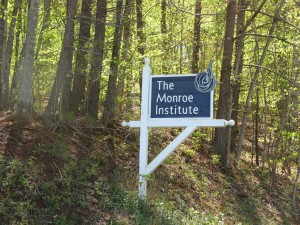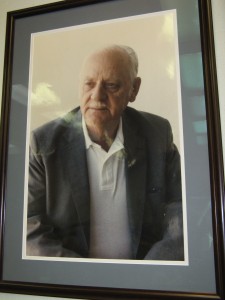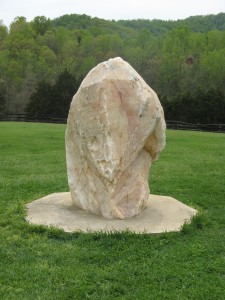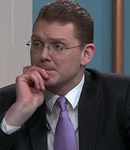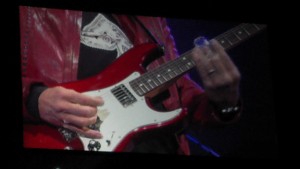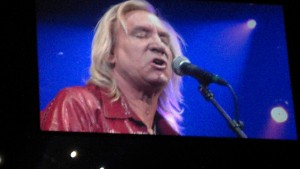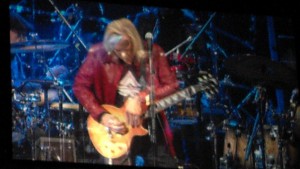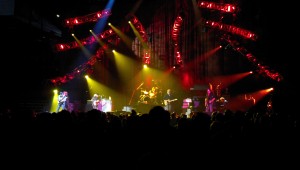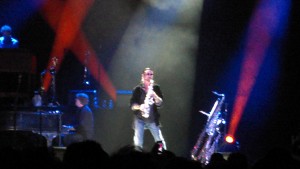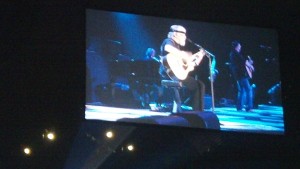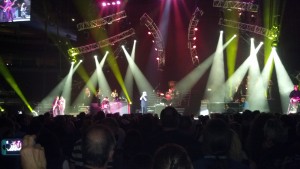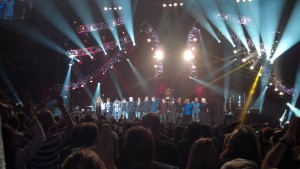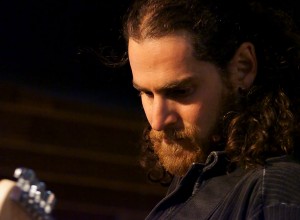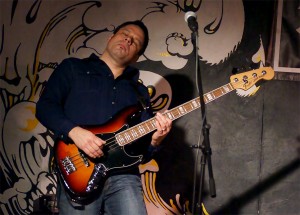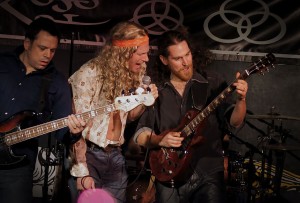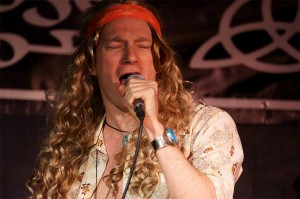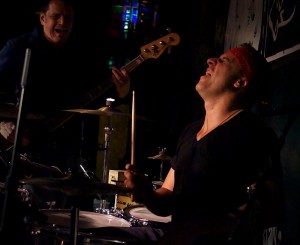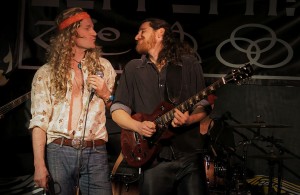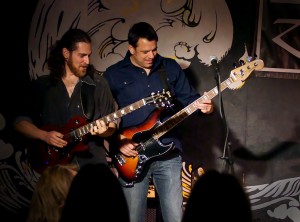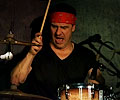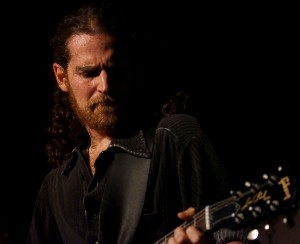Interview by Patricia Walker with photos by Mike Barry
Band Members:
James Songfield – (Robert Plant) vocals
Eyal Rivlin – (Jimmy Page) guitar
Chad Coonrod – (John Bonham) drums
Michael Mitchell – (John Paul Jones) bass, mandolin, harmonies
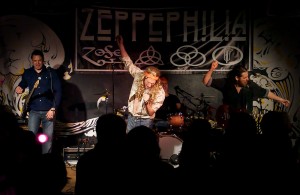
Halfway through their first set at the D-Note in Arvada, Colorado, Zeppephilia’s drummer Chad Coonrod, stood up from behind his drum kit and, dripping in sweat, shouted into the microphone, “Let’s get dirty!”
Now that’s what I’m talkin’ about—Led Zeppelin’s “The Lemon Song”—down-and-dirty blues. I’ve had the pleasure of watching Zeppephilia perform several times now and they always ooze with energy and skilled craftsmanship—so much so that you won’t find yourself sitting in your seat for long.
As the lead guitarist of this Led Zeppelin tribute band, Eyal Rivlin wants his audience to know that “the name ‘Zeppephilia’ is a combination of the words ‘Zeppelin’ and the Greekword ‘philia’ which means ‘the love of,’ and so Zeppephilia could be translated as ‘the love of Zeppelin.’”
Can’t argue that. Their love for the music comes through in every song they play.
“It’s a cathartic outlet,” says Rivlin, who’s been playing guitar for over 25 years. “I feel like it’s my prayer too. To be able to channel that is just an absolute joy … When I was a kid, it just seemed like the cool thing to do. Playing guitar always made sense to me. Over the years, it’s been a voice, an outlet whenever intense emotions are going on, to be able to let them out in a healthy way. It’s also been a way to connect with people and share on a more intimate level.”
That’s certainly evident in his music. Besides guitar, he also plays bass and sitar, has released over a dozen CDs, a DVD, and several music books and is in demand as a session guitarist and teacher.
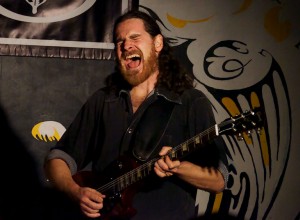
Eyal Rivlin
Since Rivlin also writes his own music, (as do Chad and Mike on occasion) I asked what inspires him.
“I think the muse is us letting ourselves become creators. There’s something about creating from the void—out of nothingness you pull out an idea or a sound or a phrase. And there’s awe in that, and there’s discovery in that; there’s magic in that. Almost like you’re stepping aside and it’s coming through you. Where does it come from? It’s a mystery; it’s The Source. Now, that said, still there’s a language that it comes through. I mean, we’ve all grown up listening to certain scales, to certain notes; we’ve been influenced … I grew up listening to Zeppelin a lot, so in a way, Zeppelin comes through me—that sound, that vibration comes through me … I think that’s part of my color palette so to speak.”
Eyal attended an elite performing arts high school in Israel which he described as “a bit like Julliard in this country.” He said that was where his love for the guitar and music in general, formed. From there, he played primarily rock and jazz, but after a trip to India, he also got into the world of kirtan. “That opened up a whole new door because it was such a different experience. The line between performer and audience was erased. Sure, I was holding an instrument, [but] I was part of a community singing together.”
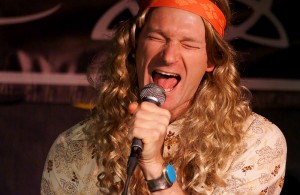
James Songfield
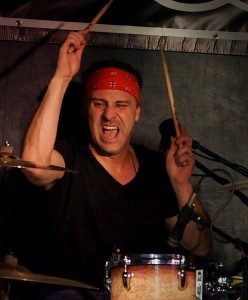
Chad Coonrod
Chad started playing drums at age ten, in 1981, when Mötley Crüe released their “Shout at the Devil” album and subsequent videos, and he saw Tommy Lee play drums. “I was going ballistic. I thought, ‘This guy is so cool,’” recalled Coonrod. Shortly after that, he bought a pair of drumsticks for fifty cents at a garage sale and went home and set up boxes, pots and pans, lids, trash can lids and all kinds of noise-makers. He didn’t stop playing on his makeshift drum set for six months. So, on his 11th birthday, his parents bought him his first real drum set. After that, he started listening to music and playing it by ear, he said. “I learned all the beginning techniques, and before I knew it, I had kids coming over to my house to listen to me play drums.”
Over the years, he’s played in bands and covered every genre of music from hard rock to funk to blues and country and just about everything in between. He’s also toured all over the United States. The only time he took a break was from 2004-2006 to earn a degree in finance. He also plays acoustic guitar in his spare time.
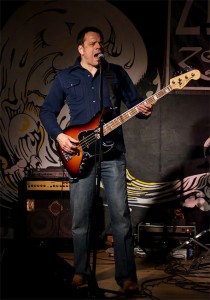
Michael Mitchell
Mike’s first instrument was the violin. “As a kid, I [also] played clarinet and saxophone and later in high school, I played a lot of percussion in bands.” he said. He went on to say that he played drums for a while, but after his drum kit grew to be too much of a pain to haul around, he took up bass. Now he says it’s his favorite instrument to play. “It’s what feels most right in my hands,” he explained. However, when I asked his favorite type of music, he said “Jazz.” “You can look at rock and roll; you can look at opera; you can look at more traditional classic music and there’s so much structure in it, where jazz is sort of a distillation of the structure. You can map it out and make variations in all these little spots… You bring your creativity to it by saying ‘This is a piece and I understand it like this but I’m going to offer an alternative that’s going to work in the key. Watch me do it!’ That’s how it really speaks to me. ”
Like Chad, Mike is primarily a self-taught musician and he traveled all over the country personally experiencing life on the road as a professional. Now, with his day job is as an IT project manager and his role as a volunteer firefighter, husband and father, his membership in another band besides Zeppephilia, he still lives a busy life. “It’s a good balance because I wouldn’t want to live as a professional musician anymore. It’s very hard not to do the overindulgence thing and string together an income on just gigs.” Now he enjoys playing music on weekends while at the same time, having an income he can depend on—the best of both worlds.
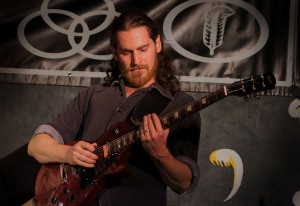 Lead guitarist Rivlin described the goal of Zeppephilia as “to share that love [of Led Zeppelin’s music]. As a band, their catalog is just unbelievable… and forty years later, it’s just as fresh and just as exciting. Kind of timeless in that sense. They embodied something that wasn’t quite there before, the supreme ‘rock star,’ almost superhuman persona, it is quite something to channel that amount of energy. They played arena shows for over 55,000 people. That’s like plugging into The Source.”
Lead guitarist Rivlin described the goal of Zeppephilia as “to share that love [of Led Zeppelin’s music]. As a band, their catalog is just unbelievable… and forty years later, it’s just as fresh and just as exciting. Kind of timeless in that sense. They embodied something that wasn’t quite there before, the supreme ‘rock star,’ almost superhuman persona, it is quite something to channel that amount of energy. They played arena shows for over 55,000 people. That’s like plugging into The Source.”
The author was unable to interview Mr. Songfield, but I’m sure he would wholeheartedly agree with that statement.
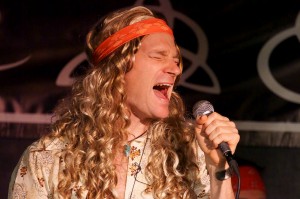 One thing that has always fascinated me is the way some musicians appear to tap into a higher energy when they perform, as if they’re so engrossed in the sound that the world around them seems to disappear, leaving only the performer and the music. I asked Eyal about this. How does he feel when he performs? What goes through his mind at times like that?
One thing that has always fascinated me is the way some musicians appear to tap into a higher energy when they perform, as if they’re so engrossed in the sound that the world around them seems to disappear, leaving only the performer and the music. I asked Eyal about this. How does he feel when he performs? What goes through his mind at times like that?
His answer was golden. “One of the reasons I came to this country [he was born and raised in Israel] was to get a Master’s Degree in transpersonal psychology. That field studies and researches all states of consciousness as part of the healing process. That quest has also lead me to India and meditation. So for me, music is a spiritual practice. And performing is a way to enter what modern psychology calls a ‘state of flow.’ And in a state of flow, [it’s] what athletes or musicians sometimes describe as entering “the zone.” In reality, any skill that you’ve put your ten thousand hours into, in a sense, you can become that skill. There’s something magical that happens at that point, something where the mind stops and you’re completely present and you’re playing but also being played. That might not happen for the whole two hours of performance, but even if it happens for a moment, that state, that taste is so sweet and so nourishing and so life-affirming.”
I asked Chad the same question.
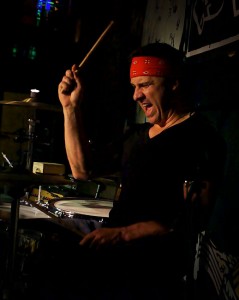
“There’s a dynamic in that,” explained Chad. “There are times when I really need to concentrate on certain parts. It may be a difficult time signature or a very dynamic section, and there are other times where I just let it GO. ‘Stairway’, ‘Dazed and Confused’, and ‘Song’ come to mind when I want to let it go; it’s so much fun! Bonham never played with a click track. He was an emotional drummer. He recorded live, hard, and full of vigor!”
“So would you say that you become something other than yourself when you perform?” I asked him.
“I’ve been playing so long, that I am who I am when on stage. There’s times when you’re just on fire and everything is in perfect harmony. Those moments are the best! [When I] get behind my kit, it just feels so right … Maybe having that universal language [of] music is why a band like us with four different backgrounds resonates so well together. Because when we perform, we are putting our heart and soul out there. It is very fulfilling to know my bandmates have my back when putting on a show! This [Zeppephilia] is an amazing project. I am blessed to have met three of the best guys. After two and half years [we’re] just as excited about it as we were when we first started. There is a peace of mind knowing that, after all the time we’ve put in, it is still fun and going strong. So in a sense, that helps me grow as a person because when you marry your life with your passion, it’s the ultimate satisfaction.”
Rivlin expounded on that. “If you look around, music is the fundamental carrier wave for all religions and spiritual paths. “There’s something when we, as a community, as a congregation, whatever you want to call it, when we all connect around a beat or around a pulse or around a vibration or a frequency, it gets everybody on the same wavelength. As a group, it aligns the energy or the state of consciousness of the audience. And that’s powerful! That’s a lot of energy to hold and to carry. It’s often the musicians who are the prophets or messengers of every generation. They create the soundtrack for the message. There would be no ‘60s without the ‘60s music. John Lennon, Bob Marley, Bono, etc… The music literally changes our brain as we get entrained to the beat or groove and move our body. It enters our soul.”
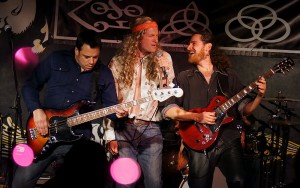
“There’s something about music,” Eyal continued. “The way it enters your ears and it literally moves the bones in your ears. The bass frequencies will shake your body and if you’re in that field, you’re affected by that field. That’s a really powerful tool.”
(Check back next week for the short conclusion of my interview with Zeppephilia and hear their comments on how playing music is like making love and what entertaining means to them.)
For more information, videos, photos and upcoming appearances, please visit the band’s website at www.zeppephilia.com or check out their Facebook page.
(Photos courtesy of Mike Barry and Fort Collins Photo Works. Used by permission. For more information, please visit www.fortcollinsphotoworks.com).


